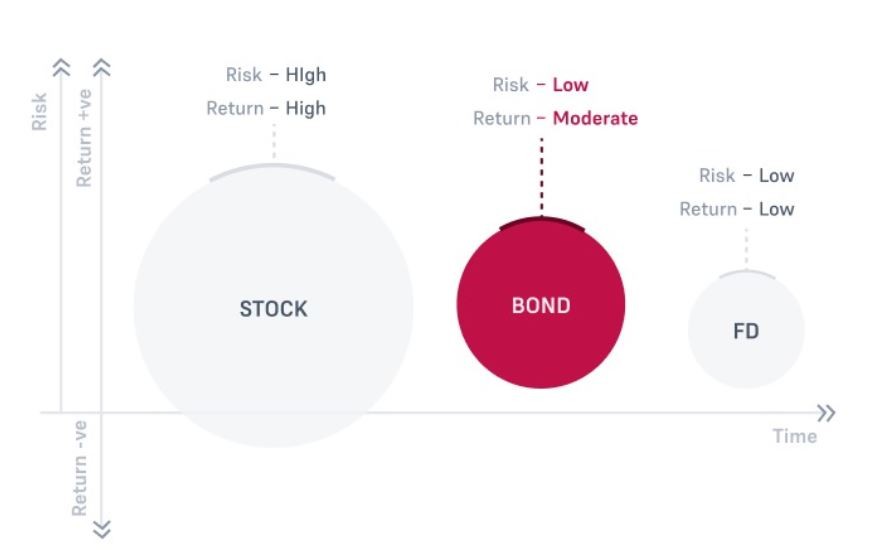What is a bond investment in India and why is it needed?
Bond investment is classified as debt security purchasing. Borrowers issue bonds to raise money from investors willing to lend them capital for a specific time. When a bond is bought, the buyers are lending to the issuer, which may be a government, municipality, or corporation. In return, the issuer promises to pay a specified rate of interest during the bond’s life and to repay the principal, also known as the face value or par value of the bond, when it “matures,” or comes due after a set period of time. They are thus a loan from an investor to an organization.
Bonds are raised for financing debt which provides cash flow that can be utilized for various reasons such as the expansion of projects, providing operating cash flow, in some rare cases to offset the previous debt. And are bought as they provide a predictable income stream, as bonds are extremely safe compared to equities, bonds if held till maturity preserve capital, and lastly along with safety some types of bonds give a lot of options that can help an investor with various types of exit opportunities.
Types of Bond Investment options in India
Government (Sovereign)
These Bonds such as those issued by the Central Government Of India, and issued by the Treasury with a year or less to maturity are called “Bills”; bonds issued with 1 to 10 years to maturity are called “notes”; and bonds issued with more than 10 years to maturity are called “bonds”. The entire category of bonds issued by a government treasury is often collectively referred to as treasuries because the payment for these bonds will come from the treasury of the country, that is, the reserves of the country, these types of bonds are thus said to be the safest types of bonds for an investor. Government bonds issued by national governments may be referred to as sovereign debt.
Corporate Bonds
These Bonds are issued by companies. Companies issue bonds—rather than seek bank loans for debt financing in many cases—because bond markets offer more favorable terms and lower interest rates. Preferred stocks are technically stocks, but they act like bonds. They pay you a fixed dividend at regular intervals. They are slightly safer than stocks in case of bankruptcy. Holders get paid after bondholders but before common stockholders.
PSU Bonds
Public sector undertaking bonds are bonds issued by public sector companies and government entities. The Indian Government has more than 50% ownership of PSU bonds, making them one of the safer investment options for medium and long-term investments from a credit risk perspective
Bond Investment Market in India
The bond investment market in India has matured significantly in the recent few years providing a relatively safe investment avenue for investors. The broad segments of the market are Central Government Securities (G-Sec), State Development Loans (SDL), and Corporate Bonds. Market depth in these securities has experienced consistent growth in terms of primary issuance as well as growing trading volumes in the secondary market. RBI regulates G-secs, SDLs, and money markets while SEBI regulates the Corporate bond market
The Indian Bond Market is worth close to 2.29 Trillion USD as of March 2022. To break it down – the domestic debt market in India amounts to about 74% of the GDP and the size of India’s corporate bond market is standing at 17% of the GDP. To put it into perspective, according to The Clearing Corporation Of India Ltd and SEBI, while the outstanding Government securities stock stands at Rs. 133.786 lakh crore (March 2022), the outstanding corporate bonds are Rs. 40.17 lakh crore (March 2022), and the entire bond investment market has grown at close to 13.60% CAGR in the past 10 years. The Indian Bond market is directly linked to a growing GDP and as the Indian GDP is growing so will the huge Bond market.
Ways to Invest in Bonds in India
- Bonds ETFs and Debt Mutual Funds – Debt Mutual funds and Bond ETFs can be bought and sold in the same way as any other Mutual Fund or ETF. Most of these Funds are very concentric towards their type, for example, a government bond fund will only invest in government bonds, same for a corporate bond but all according to their ratings. An example of government funds will be Gilt mutual funds which can be a convenient option to invest in government bonds. These funds are debt mutual funds that solely invest in bonds and fixed-income securities. It is essential to note gilt funds are slightly different from bond funds which may invest in corporate bonds. Gilt mutual funds entirely invest in government securities.
- Broking Account -Direct investment is another option to buy government bonds and a few corporate bonds which are listed. All that is needed to do is have a demat account and a trading account with a brokerage house. Once an investor has them, they can buy and sell bonds as per their choice.
- RBI Retail Direct –Launched in November 2021, provides another opportunity for investors to invest in bonds for those who are looking forward to investing directly in government bonds, RBI Retail Direct can help facilitate the same, all that is required is to have an account made directly on their website.
- A Few Bond Investment Platforms for Retailer Buyers
- AltiFi – AltiFi is a new-age wealth management platform that helps HNIs, mass affluent, and retail investors access high-quality high-return bonds, which were traditionally only available to institutional investors. These securities help investors diversify their portfolios, earn better returns on their investments and reduce exposure to market volatility. They have investments worth more than 250 Cr. INR from more than 3000 customers. They have bonds of all categories available – from payments on a monthly basis to even straight at maturity, unsecured to senior secured, and yields from below 9% to even as high as 13% from various types of companies listed and unlisted.
- Wint Wealth – Wint Wealth with a motto of – ‘Democratizing Debt investments in India’ works towards earning high returns in debt, which has low risk, made and curated by Wint Wealth. They have a huge client base of close to 39,000 investors with more than 600 Cr. Inr investments in Bonds. They have bonds of various types from quarterly payments to straight at maturity, Listed and unlisted companies, and even high returns in double digits. Wint Wealth is backed by various founders and top execs of companies such as Zerodha, CRED, Groww, Motilal Oswal, and smallcase amongst others, lastly, minimum investments can go from 5,000 Rs.
- GripInvest – GripInvest initially started as a platform to provide investment in leasing finance opportunities but over a period of time it has started offering multiple asset classes such as Real Estate, Startup equity, and Bonds. They partner with NBFCs and offer high-yielding opportunities for retail investors with low minimum ticket sizes.
Bond Investment in India Risk
There are 2 risks when someone is looking to invest in Bonds in India
Credit Risk
Credit Risk is the probability of the borrower defaulting on their loan obligations. This is higher for corporate bonds as compared to Government bonds as the latter has a sovereign guarantee. To ensure the risk is minimized we should go through the company’s annual reports and rating rationale documents available publically when investing in corporate bonds.
Duration Risk
Duration Risk is the price sensitivity of the bond due to the change in the interest rate. Unlike the credit risk majority of the time, we are exposed to duration risk when we buy government bonds. This is because most bonds have long tenors including Gilt Funds. Hence even a small change in interest rate can impact the bond price. This can be a good investment opportunity when rates are declining
Concluding Words on Bond Investment in India
Bonds can be a great asset class to diversify the portfolio and reduce overall volatility. These can complement the equity investment. With the advent of technology lot of new platforms are emerging which gives a lot of options to choose from. However, it is important that investors do a thorough analysis of the issuer before investing the money



